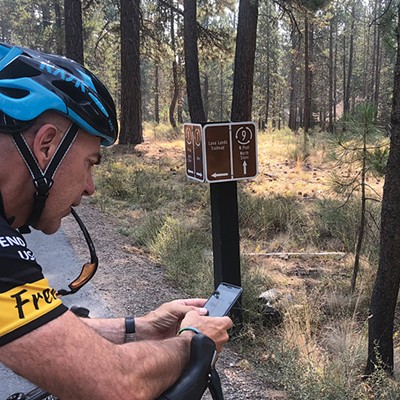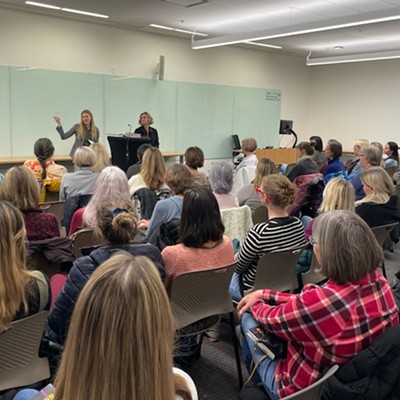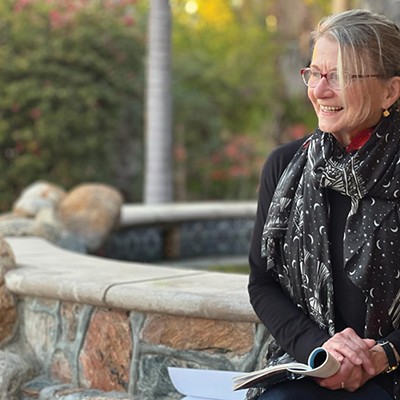When I walked into the office on a recent Wednesday morning, four minutes after nine, Freund was already patiently waiting for me, even though we had agreed to meet between nine and nine thirty. As the brawny and fantastically mustachioed 54-year-old took my extended hand in his, I could tell I was going to like him. I could also tell he was holding back a bit in that handshake. His large powerful hands were thick and rough, a product of his rather unusual day job as a horseshoer, or farrier.
The gregarious Bend native spends his workdays rising with the sun in preparation for the full day ahead. Driving his Ford pickup truck and loaded-down trailer to various ranches, farms and private homes, "Walt the Horseshoer," as he is known by many horse owners in the area, has happily spent the last 25 years lifting the legs of horses in order to inspect, trim and shoe their hooves.
"Our job (farriers) is to make the horse comfortable and get the most performance out of them as possible," Freund explains. "We're like horse podiatrists."
Because this winter has been a mild one, Freund is already shoeing horses, a task he usually performs later in the year as the 60-degree days become more consistent.
"I don't care for winter," Freund says, adding that aside from skiing, he prefers Central Oregon's warmer months. The weather doesn't much affect his busy schedule, only what tools he brings along.
A smile is permanently plastered across Freund's red, creased face and though his strong hands are callused and stained, he pets and strokes each horse with a tender touch. He always makes time for a lively exchange with the horse's owner - an aspect of his job I suspect he enjoys as much as caring for the horses. But his passion is most obvious when he works on the horse's hooves. Bent over at the waist for most of the day, his swift work appears casual, but Freund is constantly gauging and assessing the hoof that he holds between his own legs. His mastery, and physical strength, is obvious during our first stop of the morning, a ranch home outside of Tumalo.
Freund greets Navarre, a large black Friesian (a big breed of horse that originated in the Netherlands), before the horse's owner, Don Southern, ambles out the back door of his home and into the morning chill to say howdy. After a friendly chat, Freund gets to work with his nippers. Perhaps his most used instrument, the nippers, looks like the love child of a pair of toenail clippers and pliers. Once every eight weeks, Freund provides a hoof trim for his clients' horses, a job that takes Freund 15 to 20 minutes. He wasn't always that fast, though.
Freund explains that after he graduated from a short course at the Oklahoma Horseshoeing School, he simply learned on the job.
"Every foot you see is different," he says. "That's part of the fun - learning."
He flips his tools in his hands with a comfortable playfulness. After he finishes clipping and filing Navarre's enormous hooves (Navarre weighs approximately 1,200 pounds), Freund lets me lift the horse's right front leg and wedge its hoof between my legs, as if I were going to do the trimming. Immediately muscles in my lower back, hips and stomach start to burn, an unfamiliar sensation that causes me to squirm. It is clear to me that I may not be built for this business.
Freund wasn't always a horse man. He grew up in the restaurant business alongside his folks, German immigrants that owned Elmer's Pancakes in what is now the home of Kayo's Dinner House on Third Street. Freund says he was on the schedule starting at age 12 and didn't make a clean break from the restaurant business until he was 30. Freund wanted to make a life of his own, independent of his parents' business. He wanted to be outside more and to work for himself. His brother-in-law and good friend, Paul Peterson, was a horseshoer and easily sold Freund on the idea.
"I've always had an affinity for animals," Freund explains, as we pull up to the ranch home of his second Tumalo clients of the day.
Megan Jewett and her husband, Dave, are retired and own two quarter horses.
"He's a great guy," Megan Jewett says to me while Freund corrals one of her horses from a pen out back.
"That's part of what he does, round 'em up," Jewett adds.
The Bend native has clearly earned the respect of his 200-plus clients, some of whom he's had for 20 years and many of whom he calls friends. Even with Freund's huge client base, there is still room for other horseshoers in Central Oregon. At least three dozen more, Freund says of the tight-knit horsehoeing community.
As we drive through Tumalo, towards Shevlin, Freund points out various horse pastures along our route and tells me about the horses and their owners. He thumbs in the directiofone house on Tumalo Reservoir Road and says that there was once a camel in their field.
"There were two camels in Central Oregon and I knew both of 'em," Freund says.
Our third and final stop of the morning is Maria Lotter's place. Lotter is a horse rescuer and has 16 horses on her 300-plus acres. After Freund trims four different horses' hooves he's ready to put horseshoes on Christopher, a 20-year-old thoroughbred.
Freund pulls off Christopher's old shoes and cleans the synthetic pads underneath them. He opens up his trailer that's equipped with a small anvil on the back for on-the-job blacksmithing, and grabs a chest that holds a rack of horseshoes and flat nails.
Freund quickly measures the hoof and pounds on his first shoe as Christopher tries to nibble on Freund's hair and hat.
Horseshoeing can be dangerous and, though Freund has never been seriously injured, he knows plenty who have. Horses will usually only kick when they're spooked, but one mighty blow is often all it takes to send you to that great pasture in the sky, Freund explains.
"A guy out in Walla Walla was dead before he hit the ground," Freund says of a horseshoer who was kicked.
As he finishes Christopher's second shoe, Freund explains that the familiar looking piece of iron protects the horses' hooves when it's ridden outside of the dirt pen - an activity that will occur with greater frequency as the weather turns warmer.
After he finishes up at Lotter's place, Freund drops me off in town before heading out to meet his afternoon clients.
He has three more stops to make before his day is done. And tomorrow he's got another full day ahead of him. But Walt the Horseshoer doesn't mind.
"I'd shoe horses for free if I could," Freund says, laughing.



















